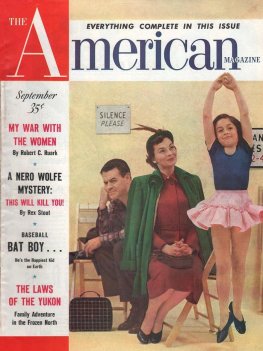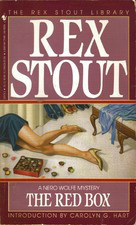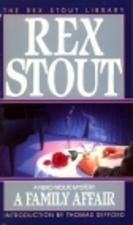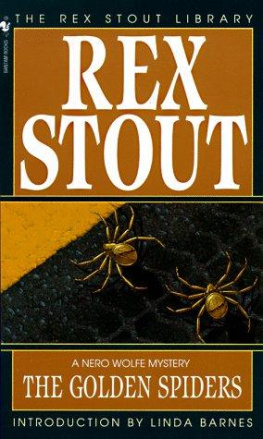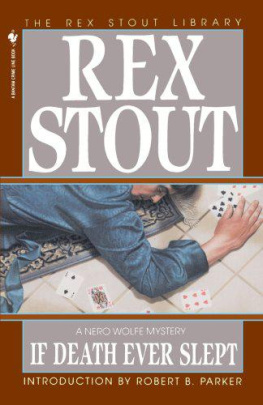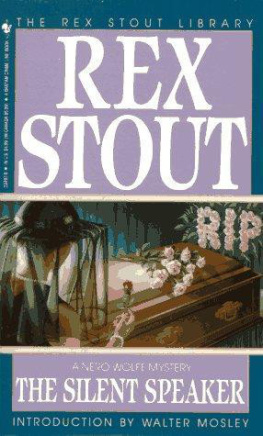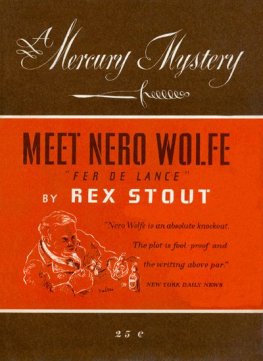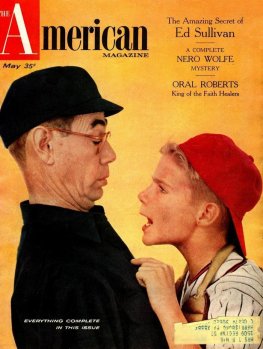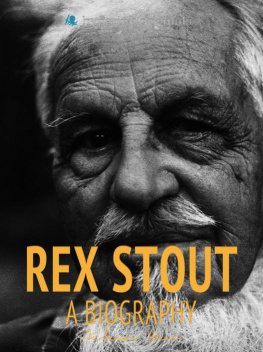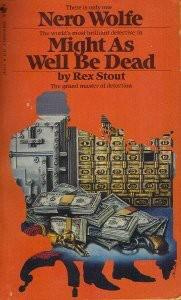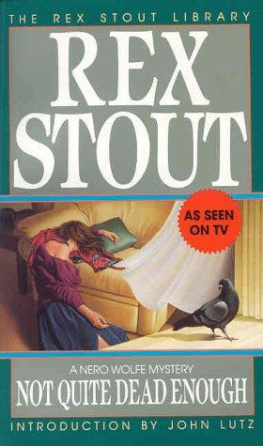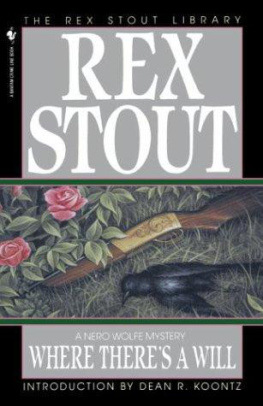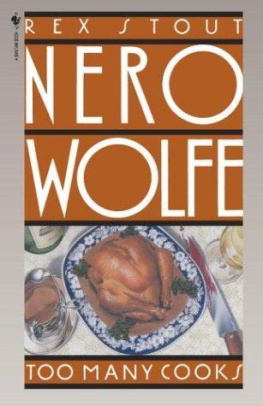Rex Stout - This Won’t Kill You
Here you can read online Rex Stout - This Won’t Kill You full text of the book (entire story) in english for free. Download pdf and epub, get meaning, cover and reviews about this ebook. year: 1952, genre: Detective and thriller. Description of the work, (preface) as well as reviews are available. Best literature library LitArk.com created for fans of good reading and offers a wide selection of genres:
Romance novel
Science fiction
Adventure
Detective
Science
History
Home and family
Prose
Art
Politics
Computer
Non-fiction
Religion
Business
Children
Humor
Choose a favorite category and find really read worthwhile books. Enjoy immersion in the world of imagination, feel the emotions of the characters or learn something new for yourself, make an fascinating discovery.
- Book:This Won’t Kill You
- Author:
- Genre:
- Year:1952
- Rating:3 / 5
- Favourites:Add to favourites
- Your mark:
- 60
- 1
- 2
- 3
- 4
- 5
This Won’t Kill You: summary, description and annotation
We offer to read an annotation, description, summary or preface (depends on what the author of the book "This Won’t Kill You" wrote himself). If you haven't found the necessary information about the book — write in the comments, we will try to find it.
This Won’t Kill You — read online for free the complete book (whole text) full work
Below is the text of the book, divided by pages. System saving the place of the last page read, allows you to conveniently read the book "This Won’t Kill You" online for free, without having to search again every time where you left off. Put a bookmark, and you can go to the page where you finished reading at any time.
Font size:
Interval:
Bookmark:
Rex Stout
This Wont Kill You
1
At the end of the sixth inning the score was Boston 11, New York 1.
I would not have believed that the day would ever come when, seated in a lower box between home and first, at the seventh and deciding game of the World Series between the Giants and Red Sox, I would find myself glomming a girl, no matter who. I am by no means above glomming a girl if she is worthy, but not at the Polo Grounds, where my mind is otherwise occupied. That awful day, though, I did.
The situation was complex and will have to be explained. It was a mess even before the game started. Pierre Mondor, owner of the famous Mondors Restaurant in Paris, was visiting New York and was our house guest. He got the notion, God knows how or why, that Wolfe had to take him to a baseball game, and Wolfes conception of the obligations of a host wouldnt let him use his power of veto. Tickets were no problem, since Emil Chisholm, oil millionaire and part-owner of the Giants, considered himself deeply in Wolfes debt on account of a case we had handled for him a few years back.
So that October afternoon, a Wednesday, I got the pair of them, the noted private detective and the noted chef, up to the Polo Grounds in a taxi, steered them through the mob into the entrance, along the concrete ramps, and down the aisle to our box. It was twenty past one only ten minutes to game time and the stands were jammed. I motioned to Mondor, and he slid in and sat. Wolfe stood and glared down at the wooden slats and metal arms. Then he lifted his head and glared at me.
Are you out of your senses? he demanded.
I warned you, I said coldly. It was designed for men, not mammoths. Lets go home.
He tightened his lips, moved his massivity, lowered it, and tried to squeeze between the arms. No. He grasped the rail in front with both hands, wriggled loose, and got what he could of his fanny hooked on the edge of the seat.
Mondor called to me across the great expanse of Wolfes back, I depend with confidence on you, Arshee! You must make clear as it develops! What are the little white things?
I love baseball and I love the Giants, and I had fifty bucks up on that game, but I would have got up and gone but for one thing. It was working hours, and Wolfe pays my salary, and there were too many people, some of them alive and loose, who felt strongly that he had already lived too long. He is seldom out in the open, easy to get at, and when he is I like to be nearby. So I gritted my teeth and stuck.
The ground crew finished smoothing off and hauled their drags away, the umpires did a huddle, the Giants trotted out on the field to their stations, the throng gave with a lusty excited roar, we all stood up for The Star-Spangled Banner and then sat again, with Wolfe perched on two slats and holding grimly to the rail. After southpaw Ed Romeike, 224 for the season, had burned a few over for the range, Lew Baker, the catcher, fired it to Tiny Garth at second. The Red Sox lead-off man came to the white line, the plate umpire said go, and Romeike looked around at the field, toed the rubber, went into his tricky windup, and shot a fast one over the outside corner for strike one. The crowd let out a short sharp yell.
My personal nightmare was bad enough. Mondor was our guest, and only eighteen hours ago I had taken three helpings of the quenelles bonne femme he had cooked in our kitchen, and would have made it four if I had had room; but trying to tell a foreigner what a base on balls is during a World Series game, with two men on, two down, and Oaky Asmussen at bat, is hard on the nerves. As for Wolfe, it wasnt so much the sight of him there in his concentrated misery; it was the certainty that by tomorrow he would have figured out a way to blame it on me, and that would start a feud.
Bad enough, but more was to come, and not for me alone. One fly had plopped into the soup even before the game started, when the line-up was announced and Tiny Garth was named for second base, with no explanation. A buzz of amazement had filled the stands. Why not Nick Ferrone? Ferrone, a lanky big-eared kid just up from the bush five months back, had fielded and batted himself so far to the front that it was taken for granted he would be voted rookie of the year. He had been spectacular in the first six games of the series, batting .427. Where was he today? Why Garth?
Then the game. This was no personal nightmare of mine, it was all too public. In the first inning Con Prentiss, the Giants shortstop, bobbled an easy grounder, and two minutes later Lew Baker, the catcher, trying to nab a runner at second, threw the ball six feet over Garths head into the outfield. With luck, the Red Sox scored only one run. In the second inning Nat Neill, center fielder, misjudged a fly he could have walked under, tried to run in three directions at once, and had to chase it to the fence; and soon after that Prentiss grabbed a hard-hit ball on the hop and hurled it into the dirt three paces to the left of third base. By the time they got three out, Boston had two more runs.
As the Giants came in for their turn at bat in the second, heading for the dugout, loud and bitter sarcasms from the stands greeted them. Then our section was distracted by an incident. A man in a hurry came plunging down the aisle, bumping my elbow as he passed, and pulled up alongside a front box occupied by six men, among them the Mayor of New York and oilman Emil Chisholm, who had provided our tickets. The man spoke into the ear of Chisholm, who looked anything but happy. Chisholm said something to the Mayor and to another of his boxmates, arose and sidled out, and beat it up the aisle double quick, followed by the courier and also by cutting remarks from nearby fans who had recognized him. As my eyes went back to the arena, Con Prentiss, the Giant shortstop, swung at a floater and missed by a mile.
There is no point in my retailing the agony. As I said, at the end of the sixth the score was 11 to 1. Romeike was doing all right, and Boston had collected only three hits, but his support would have been pitiful on a sandlot. Joe Eston and Nat Neill had each made two errors, and Con Prentiss and Lew Baker three apiece. As they came to the dugout in the sixth, one wit yelled, Say it aint so, Joe! at Eston, and the crowd, recognizing that classic moan to Shoeless Joe Jackson, let out a howl. They were getting really rough. As for me, I had had plenty of the tragedy out on the diamond and looked around for something less painful, and caught sight of the girl, in a box off to my right.
I glommed her, not offensively. There were two of them. One was a redhead who would start to get plump in a couple of years, almost worthy, but not quite. The other one, the glommee, had light brown hair and dark brown eyes, and was fully qualified. I had the feeling that she was not a complete stranger, that I had seen her somewhere before, but couldnt place her. The pleasure it gave me to look at her was not pure, because it was adulterated with resentment. She looked happy. Her eyes sparkled. Apparently she liked the way things were going. There is no law barring Boston fans from the Polo Grounds, but I resented it. Nevertheless, I continued the glommation. She was the only object I had seen there that day, on or off the field, that didnt make me want to shut my eyes and keep them shut, and I sure needed it.
Something came between her and me. A man stopped at my elbow, leaned down, and asked my ear, Are you Archie Goodwin?
I told him yes.
Is that Nero Wolfe?
I nodded.
Mr. Chisholm wants him in the clubhouse, quick.
I reflected for two seconds, decided that this was straight from heaven, and slid forward to tell Wolfe, Mr. Chisholm invites us to the clubhouse. Well avoid the crush. Theres a chair there. He want to see you.
Font size:
Interval:
Bookmark:
Similar books «This Won’t Kill You»
Look at similar books to This Won’t Kill You. We have selected literature similar in name and meaning in the hope of providing readers with more options to find new, interesting, not yet read works.
Discussion, reviews of the book This Won’t Kill You and just readers' own opinions. Leave your comments, write what you think about the work, its meaning or the main characters. Specify what exactly you liked and what you didn't like, and why you think so.

